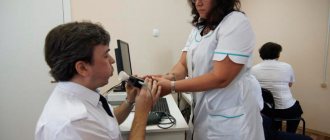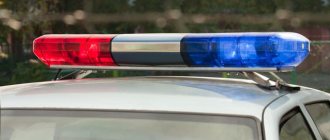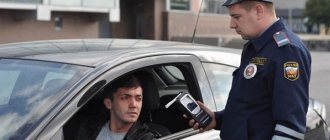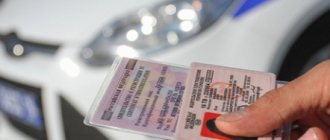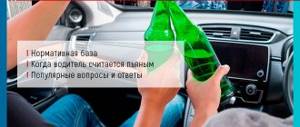How dangerous is drug intoxication?
Drug intoxication is a physiological state that occurs after the use of drugs and/or psychotropics included in the lists subject to control in the Russian Federation (Government Decree No. 681 of June 30, 1998), and manifests itself in the form of euphoria, perception disorders and inappropriate behavior.
A drug addict may perceive the surrounding reality too acutely or too slowly. There is no point in telling what this can lead to when driving a car.
The driver is not able to realistically assess the situation and react correctly to its changes, which means he is incapacitated and very dangerous.
Clause 2.7 of the Traffic Regulations states that it is prohibited to drive a car or hand over the steering wheel to another person while intoxicated. The driver is prohibited from using drugs even after an accident until a decision on the examination is made.
Is it possible to drive a vehicle after smoking marijuana?
However, drugs are different. Some people believe that using marijuana while driving is not dangerous. Perhaps this is true from the point of view of the relatively weak effect of this substance on the nervous system and physiology of the driver. However, in Russia this herb is not officially permitted, as in some European countries, and driving licenses are deprived of its use.
Moreover, if you smoked marijuana for the first time in your life, traces of it will be removed from the body only after three days. If you smoke rarely, after ten days, and if you use regularly, residues of the drug can be detected in the blood and urine after forty, and in some cases, even after ninety days. In addition, accepted methods for detecting intoxication do not allow determining the time of the last drug use. Therefore, if you smoke marijuana and drive a car, this is worth taking into account.
In addition, the driver thinks that his reaction is not reduced, but in fact this is not entirely true. Recent studies by American scientists suggest that smoking marijuana while driving is dangerous. Many countries around the world have restrictions on the amount of THC (the active compound in cannabis) in the blood. But this doesn’t work in Russia, and marijuana is included in the list of prohibited substances.
Deprivation of driver's license for drug intoxication for the second time
If a driver who has already been deprived of his license once for driving while intoxicated is caught with the same offense again, the period of deprivation of license is increased to 3 years. This applies to those who were caught in 2021 after the return of their rights. If a person is caught without a permit and while a court decision is in effect, the term increases. If you continually violate the law, your sentence will increase. As a result, the driver may be deprived of his license for life. The fine for repeated violation has been increased to 200–300 thousand rubles.
In addition, in case of repeated violation, the court may impose forced labor for up to 2 years and correctional labor for up to 480 hours.
Unacceptable content of narcotic substances in the driver’s blood
The minimum concentrations of narcotic drugs, psychotropic and other substances that cause intoxication in urine are determined in a letter from the Central Chemical-Toxicological Laboratory at the Department of Analytical and Forensic Toxicology of the 1st Moscow Medical University. I. M. Sechenova:
- opiates – 500 ng/ml;
- cannabinoids - 25 ng/ml;
- phenylalkylamines ‒50 ng/ml;
- methadone - 50 ng/ml;
- benzodiazepines - 50 ng/ml;
- cocaine – 50 ng/ml;
- barbiturates - 500 ng/ml;
- cotinine - 20 ng/ml;
- synthetic cannabinoids - 5 ng/ml.
As for blood levels, the standards are not currently established by law; at the initiative of State Duma deputies, they are planned to be introduced in the near future. Until then, any concentration of narcotic substances in plasma is illegal.
What medications should you not take while driving?
It is worth considering that seemingly harmless medications can also cause reactions comparable to intoxication. The substances contained in them give positive tests in samples, and some of them are included in the list of prohibited substances for circulation in their pure form. The difficulty is that it is almost impossible to determine on your own, based on how you feel, how long it will take to start driving after taking medications.
According to the degree of “danger” for the driver, medications are conventionally divided into:
- containing psychotropic/narcotic substances;
- comparable to drugs in the nature of their effects.
Even small doses of some medications can cause intoxication under certain conditions. This must be taken into account by drivers, especially those who are used to self-medication.
How is the state of drug intoxication determined?
After taking drugs, characteristic symptoms occur:
- excessively dilated/constricted pupils;
- nervous tic, tremor;
- abnormal agitation;
- changed voice timbre;
- underweight and excessive sweating;
- instability, inappropriate reactions and behavior.
State Traffic Inspectorate employees pay attention to these external signs. If they are caught driving under the influence of drugs, then:
- They will make a decision to remove you from driving the vehicle.
- They will draw up a protocol on referral for a medical examination.
- If necessary, the driver will be taken to the place of medical examination.
To establish drug intoxication, a special procedure is provided. Only a laboratory test can confirm the fact of drug use, the results of which sometimes have to wait several days.
Referral for examination
Medical examination for alcohol and drugs must be carried out only by a certified laboratory according to the rules set out in Appendix 1 of Order of the Ministry of Health No. 933n dated 12/18/15. The referral protocol is drawn up in the form approved by Order of the Ministry of Internal Affairs No. 676 of 08/04/08. In this case, the traffic police officer must have grounds, as stated in Art. 27.12 Code of Administrative Offences. We are talking about the external signs of drug intoxication given above.
The data of the driver and the traffic police officer are entered into the protocol, the grounds, date, and time of compilation are indicated, after which the document is signed. A copy is given to the driver. If he refuses to sign the protocol, this fact is noted in the document. Everything happens in the presence of two understandable people.
Employees can take the offender to a medical facility if he is unable to stand.
Drug testing
The procedure is not pleasant, but it is mandatory, although, according to many who have undergone it, it is not always objective. So, in general, the process includes:
- Examination by a specialist (doctor or paramedic).
- Determination of the percentage of alcohol in exhaled air.
- Examination of urine and blood for the level of active compounds.
- Drawing up an act (form No. 307/u-05 in Appendix 2 to Order No. 933).
Medical examination for drugs is carried out only by a doctor using special means. More often, a rapid urine test is performed, for which you will have to donate 30 ml. The driver can resist what is happening - both when offered to undergo a medical examination, and when certain conditions or procedures are met. In this case, the process is immediately stopped, and a corresponding entry is made in the accounting journal.
If a medical examination for drugs is refused, the traffic police officer draws up another protocol - an administrative violation under Article 12.26 of the Code of Administrative Offenses.
It makes sense to refuse a medical examination only if the demands are illegal.
A repeat medical examination should be scheduled no later than two hours later. If you are confident that you are right, the driver can undergo an independent examination.
How to appeal a medical examination
The law does not exclude the possibility of challenging the results of a medical examination. In this case, a timely independent examination will be required. This is the only way to disprove drug intoxication while driving. There are two appeal options:
- Administrative (extrajudicial). Includes filing a complaint with a higher authority of the traffic police within 10 days from the receipt of a copy of the protocol. The document is also reviewed within ten days.
- Judicial. In this case, legal assistance will be needed. Proof of any violation during the referral for a medical examination or the procedure itself will decide the issue in favor of the accused. Documentary confirmation of the presence of individual physiological characteristics of the body that manifest themselves when taking non-prohibited medications that show positive tests will also help.
Getting your driver's license back after being revoked for drug intoxication
First of all, it is necessary, by court decision, to register with a narcologist. This may be a preventative measure if a detailed violation occurs for the first time. If the driver is detained again, a dispensary registration is assigned. It will be possible to be removed from the last registration only upon receipt of a certificate of physical and mental health that is not affected by prohibited substances.
30 days before the expiration of the period for which the driver's license was confiscated, it is necessary to submit an application to the traffic police authorities for the return of the license. According to the law, if you are deprived of your license while driving under the influence of drugs, you must pass a theoretical exam on your knowledge of traffic rules upon return.
In addition, the following documents will be required:
- Passport or driver's ID card.
- A document indicating that the license was handed over to the traffic police, indicating the date.
- A copy of the court decision on deprivation of rights.
You will also need a certificate from a narcologist about deregistration.
What is the penalty for driving while intoxicated?
The punishment for drugs while driving can only be determined by a judge based on the case materials, the decision of the traffic police, the inspection report and the provisions of the Code of Administrative Offenses, and in some cases - the Criminal Code. The following types of liability are provided:
- large financial fine;
- deprivation of rights for a long period;
- administrative arrest, and in some cases - imprisonment.
Revocation of driver's license
Article 12.8 of the Code of Administrative Offenses says almost everything about this type of punishment applied to drivers as a preventive measure for driving while intoxicated.
Even if no signs of a criminal offense are detected, a driver found to be using drugs may be deprived of his driving license for 1.5-2 years.
For handing over the steering wheel to a person in a state of intoxication, the same period of deprivation of rights is determined.
In this case, immediate seizure of the device does not occur on the spot. The violator submits the document to the traffic police department by court decision within 3 days established by law.
Fine
The state is trying to deal with violating drivers by increasing penalties. For example, the fine for driving under the influence of drugs or transferring control to a drunk driver is set at 30,000 rubles. The amount is significant, and only for the first violation of this kind. In addition, the 20-day preferential payment rule does not apply to this case.
When is arrest applied?
Administrative arrest for 10-15 days is applied to drivers under the influence of drugs who did not have the right to drive even when sober. For example, they were deprived of or did not receive a driver's license. But this applies to cases where the actions of the violator are not classified as a criminal offense.
The measure is prescribed only by court, is applied in exceptional cases and does not apply to pregnant women and those with children under 14 years of age, disabled people of groups 1 and 2, military personnel, as well as current employees of the Ministry of Internal Affairs. Also applies for repeat violations.
For repeated violation
Repeated driving under the influence of drugs carries more severe penalties:
- fine up to 50,000 rubles;
- deprivation of driver's license for up to 3 years;
- arrest for 10-15 days.
If the violation was committed during the period of validity of the previously imposed penalty, the Criminal Code is involved. Responsibility in this case becomes stricter:
- fine – 200,000-300,000 rubles;
- corrective labor – up to 480 hours;
- forced labor or imprisonment - up to 2 years.
At the same time, deprivation of a driver's license for up to 3 years and the right to occupy certain positions is provided.
If the driver does not have a driver's license and is under the influence of drugs
If a driver is caught without a license, and even in a state of drug intoxication, he faces arrest for 10-15 days. In relation to persons to whom a measure in accordance with the Code of Administrative Offenses cannot be applied (read above), a fine of 30 thousand is used as punishment.
If you get into an accident while under the influence of drugs
For violation of traffic rules that resulted in an accident while under the influence of drugs, in which people were injured or killed, a more severe punishment is provided than in relation to sober drivers who committed the same thing. The fact is that the law considers intoxication as an aggravating circumstance.
Now let’s figure out the dangers of detecting narcotic and psychotropic substances in the driver’s urine or blood during an accident. In Art. 264 of the Criminal Code states that for grievous bodily harm due to negligence the following are provided:
- forced labor – up to 3 years;
- imprisonment - up to 4 years.
And this is not counting the ban on holding certain positions/engaging in specific activities for up to 3 years. And if the victim died as a result of an accident, he faces imprisonment for 2-7 years. When there is more than one death, the prison term can be up to 4-9 years.
Procedure for deprivation of rights for drug intoxication in 2021
To establish the fact of drug intoxication in 2021, the driver must be sent for examination. This procedure consists of urine and blood tests. Each group of substances has its own permissible concentration value in biomaterials. The procedure for examining a driver’s drug intoxication must be carried out by doctors who have special clearance.
Prohibited substances, the presence of which in the blood will lead to the deprivation of rights in 2021, include:
- Cocaine.
- Amphetamine.
- Marijuana.
- Heroin.
- Opium.
- Morphine.
- Hemp.
- Hashish.
- Cannabis.
- LSD.
The collection of biomaterial is carried out with the participation of witnesses, and the analyzes are immediately sealed and sent for examination. State inspectors cannot be witnesses, otherwise it is considered a violation and the procedure for taking samples is illegal. Video filming is also allowed under paragraph 40 of Order of the Ministry of Internal Affairs No. 664 dated 08.23.17
For medical examinations, stations must be equipped with clean water and a refrigerator for storing tests. Otherwise, the driver can challenge the deprivation of rights and the results of the drug intoxication examination. If there is no mobile unit, the driver must be removed from control and taken to the nearest medical facility where such an analysis can be performed.
If a person refuses to submit biomaterial, then in 2021 he is automatically recognized as being under the influence of drugs, and his case is sent to court for deprivation of the right to drive.
Based on the report of the traffic police officer, as well as the test results, the driver is deprived of the right to drive a vehicle in court, and is also held accountable under Article 12.8 of the Code of Administrative Offenses of the Russian Federation.
During the procedure, the inspector must draw up several protocols, including the removal from driving, the medical examination and the sending of the car to the impound lot.
All protocols must be signed by the driver and witnesses.
The entire procedure includes the following mandatory points:
- Vehicle stop.
- Identification of clinical signs of drug intoxication in the presence of witnesses.
- Medical examination.
- Conclusion with results.
- Creation of an administrative case on the seizure of a certificate.
- Transfer to court.
- Trial.
- Judgment.
- Deprivation of rights for drug intoxication.
In case of any violation of the procedure, the withdrawal of rights is considered illegal.
